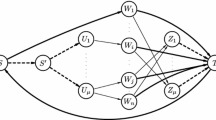Abstract
Election Campaign Optimization (ECO) algorithm is a new heuristic algorithm, it works by simulating the behavior that the election candidates pursue the highest support in campaign. The candidates can influence the voters round them. The higher prestige a candidate comports, the larger effect he has. Voters have to allot their support proportionally according to the effects imposed by the candidates. Global and local survey-sample to voters are done to investigate the support of candidates. The proportion of the support to a candidate from a voter to the sum of the support of the candidate from all voters is the contribution of a voter to the candidate. The sum of location coordinates of every voters powered by its contribution is a new location coordinates, it is the next position of the candidate. Such cycle is done continually until a candidate finds the position of the highest support. In this paper, several benchmarking functions are used to verify ECO algorithm.
The work was supported by the National Science Foundation of China (50676022); Provincial Science Foundation of Guangdong (07001748).
Access this chapter
Tax calculation will be finalised at checkout
Purchases are for personal use only
Preview
Unable to display preview. Download preview PDF.
Similar content being viewed by others
References
Wolpert, D.H., Macready, W.G.: No free lunch theorems for optimization. IEEE Transactions on Evolutionary Computation 1, 67–82 (1997)
Li, J., Lv, W.G., Hou, M.H.: Path planning for mobile robot based on Election Algorithm. Machine Tool & Hydraulics 37, 30–31, 68 (2009)
Lv, W.G., Du, J.H., Li, J., et al.: Optimization of double universal coupling using competitive algorithms. Journal of Gongdong Non-Ferrous Metals 1, 221–223 (2007)
Zheng, L.L., Lv, W.G.: The optimization design of machine-tools spindle structure based on competitive algorithm. Machinery Design & Manufacture 8, 35–37 (2006)
Liu, Y., Tang, L.S., Chen, Y.P.: Non-numerical Parallel Algorithm-Genetic Algorithm. Science Press, Beijing (1995)
Author information
Authors and Affiliations
Editor information
Editors and Affiliations
Rights and permissions
Copyright information
© 2010 Springer-Verlag Berlin Heidelberg
About this paper
Cite this paper
Lv, W. et al. (2010). Verifying Election Campaign Optimization Algorithm by Several Benchmarking Functions. In: Tan, Y., Shi, Y., Tan, K.C. (eds) Advances in Swarm Intelligence. ICSI 2010. Lecture Notes in Computer Science, vol 6146. Springer, Berlin, Heidelberg. https://doi.org/10.1007/978-3-642-13498-2_76
Download citation
DOI: https://doi.org/10.1007/978-3-642-13498-2_76
Publisher Name: Springer, Berlin, Heidelberg
Print ISBN: 978-3-642-13497-5
Online ISBN: 978-3-642-13498-2
eBook Packages: Computer ScienceComputer Science (R0)




